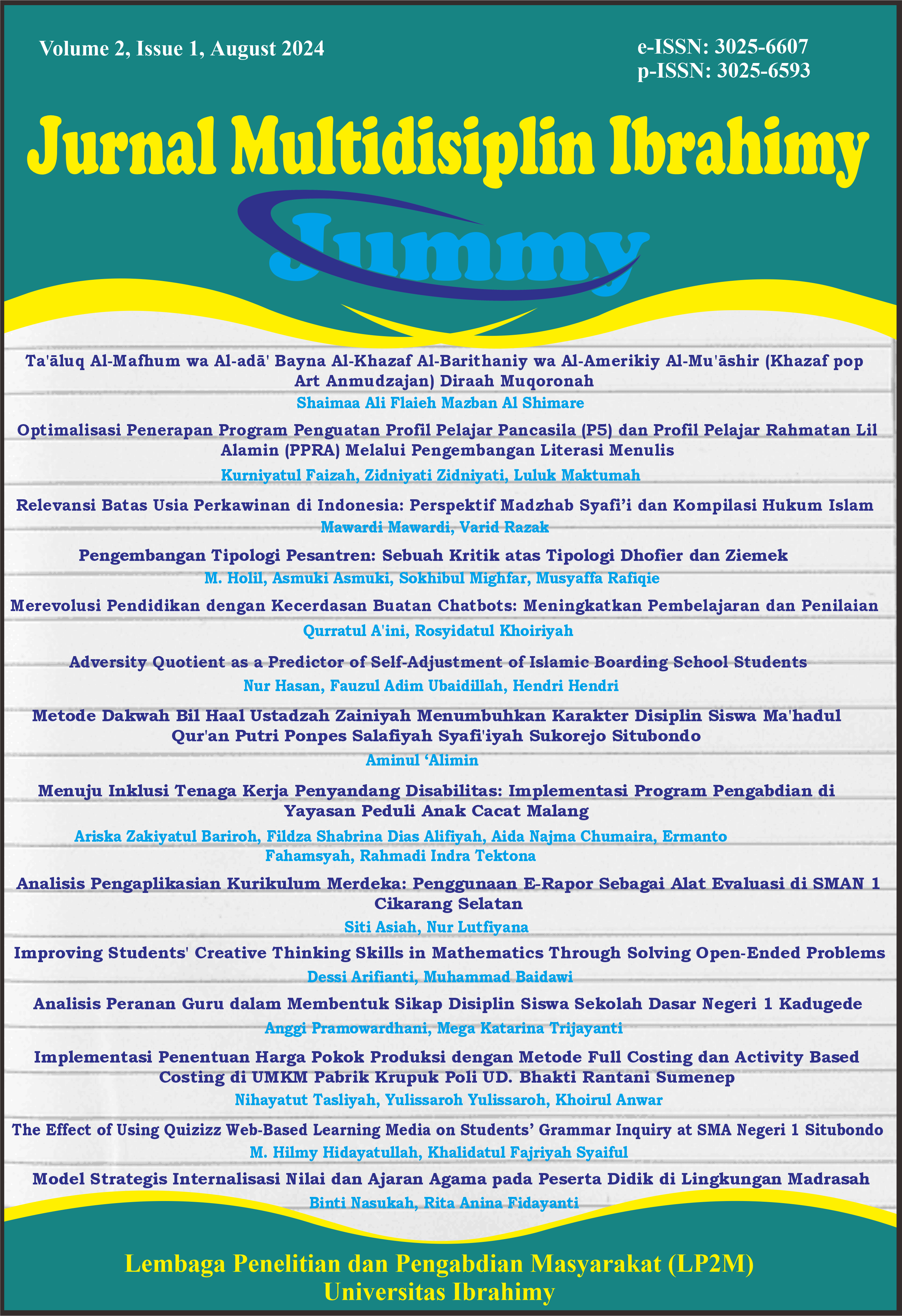The Effect of Using Quizizz Web-Based Learning Media on Students’ Grammar Inquiry at SMA Negeri 1 Situbondo
DOI:
https://doi.org/10.35316/jummy.v2i1.5590Kata Kunci:
Grammar, Learning Media, QuizizzAbstrak
One of learning application that is commonly used in learning English is Quizizz. The purpose of this study is to determine the effect of Quizizz web-based learning media on students’ grammar inquiry. This research used quasi experimental research. The data collection method used was pre-test and post-test of grammar. The sample of this research was class XII MIPA 1 which consisted of 31 students and XII MIPA 2 which consisted of 34 students. The research variable was the Quizizz web-based learning media as independent variable and students’ grammar inquiry as dependent variable. The findings indicated that the mean score of the students’ before using Quizizz web-based learning media got 51.25 in experimental group and got 55.71 in control group. The mean score after using Quizizz web-based learning media was 77.68 in experimental group and 75.36 in control group. This educational research uses 5% significance level. The t-test analysis is used in this research based on the sample size that is below 30 samples with t-score 1.729. based on output pair 1 on table 4.6, t value 0.184 < 1.729, there is no difference between the average student learning outcomes for the experimental group post-test and control group post-test. So, it can be concluded that there is no effect of using Quizizz web-based learning media on students’ grammar inquiry.
Referensi
Anak Yunus, C. C., & Hua, T. K. (2021). Exploring a gamified learning tool in the ESL classroom: The case of Quizizz. Journal of Education and E-Learning Research, 8(1), 103–108.
Bicen, H., & Kocakoyun, S. (2018). Perceptions of students for gamification approach: Kahoot as a case study. International Journal of Emerging Technologies in Learning, 13(2), 72–93. https://doi.org/10.3991/ijet.v13i02.7467
Bircan, U. (2015). Roland Barthes ve göstergebilim. Sosyal Bilimler Araştırma Dergisi, 13(26), 17–41.
Burns, A. (2016). Research and the teaching of speaking in the second language classroom. Handbook of Research in Second Language Teaching and Learning, 242–256.
Darmawan, M. S., Daeni, F., & Listiaji, P. (2020). The use of quizizz as an online assessment application for science learning in the pandemic era. Unnes Science Education Journal, 9(3), 144–150.
Degirmenci, R. (2021). The use of Quizizz in language learning and teaching from the teachers’ and students’ perspectives: A literature review. Language Education and Technology, 1(1), 1–11.
Dextre-Vilchez, S. A., & Vásquez-Mercado, R. P. (2022). Perception of the implementation of the Quizizz app in a virtual course of microbiology. Investigación En Educación Médica, 11(41), 35–43.
Frank, M. (1972). Modern English: A Practical reference Guide. Prentice Hall.
Goumas, S., Terzopoulos, G., Tsompanoudi, D., & Iliopoulou, A. (2020). Wordsearch, an Educational Game in Language Learning. Journal of Engineering Science & Technology Review, 13(1), 50–56. https://doi.org/10.25103/jestr.131.07
Hall, M., Azar, B. S., Koch, R. S., & Hagen, S. A. (2010). Understanding and using English grammar. (No Title).
Hinkel, E. (2016). Practical grammar teaching: Grammar constructions and their relatives. In Teaching English grammar to speakers of other languages (pp. 171–199). Routledge.
Lim, T. M., & Yunus, M. M. (2021). Teachers’ perception towards the use of Quizizz in the teaching and learning of English: A systematic review. Sustainability, 13(11), 6436.
Mahmud, M. S., & Law, M. L. (2022). Mathematics teachers’ perceptions on the implementation of the quizizz application. International Journal of Learning, Teaching and Educational Research, 21(4), 134–149.
Muji, A. P., Ambiyar, A., Aziz, I., & Hidayat, H. (2021). The implementation of Quizizz-based online evaluation in higher education: An exciting alternative for evaluation. International Journal of Research in Counseling and Education, 5(2), 149–157.
Munawir, A., & Hasbi, N. P. (2021). The Effect of Using Quizizz to EFL Students’ Engagement and Learning Outcome. English Review: Journal of English Education, 10(1), 297–308.
Pertiwi, A. P. (2020). Using The Quizizz as an Assessment of Students’ English Learning. Journal of English Teaching, Applied Linguistics and Literatures (JETALL), 5(1), 37–44. https://doi.org/10.20527/jetall.v5i1.10859
Purba, L. S. L. (2020). The effectiveness of the quizizz interactive quiz media as an online learning evaluation of physics chemistry 1 to improve student learning outcomes. Journal of Physics: Conference Series, 1567(2), 22039. https://doi.org/10.1088/1742-6596/1567/2/022039
Rahayu, I. S. D., & Purnawarman, P. (2019). The use of Quizizz in improving students’ grammar understanding through self-assessment. Eleventh Conference on Applied Linguistics (CONAPLIN 2018), 102–106. https://doi.org/10.2991/conaplin-18.2019.235
Setiyani, S., Sumarwati, S., Astuti, A. D., Santi, D. P. D., & Suprayo, T. (2021). Using quizziz application to make online evaluations during covid-19 pandemic: teacher competency training. Engagement: Jurnal Pengabdian Kepada Masyarakat, 5(1), 19–29.
Sugiyono, S. (2018). Metode Penelitian Kuantitaif Kualitatif dan R & B. Alfabeta.
Syafriafdi, N. (2023). The Role of Quizizz Application in Learning: A Literature Review. Jurnal Pendidikan, 14(1), 126–138.
Yuliawati, L. (2021). The Effects of Vocabulary and Grammar Mastery on Students’ Writing Skill. Journal of English Language Learning, 5(2), 113–118.
Zuhriyah, S., & Pratolo, B. W. (2020). Exploring Students’ Views in theUse of Quizizz as an Assessment Tool in English as a Foreign Language (EFL) Class. Universal Journal of Educational Research, 8(11), 5312–5317.
Žukauskas, P., Vveinhardt, J., & Andriukaitienė, R. (2018). Exploratory research. Management Culture and Corporate Social Responsibility, 189.
Unduhan
Diterbitkan
Cara Mengutip
Terbitan
Bagian
Lisensi












_by_Matematohir.jpg)


